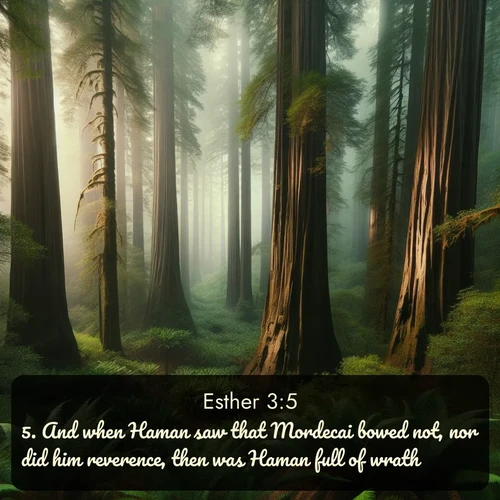Esther 3:5 plusieurs versions / traductions
English Bible Translations
5. And when Haman saw that Mordecai bowed not, nor did him reverence, then was Haman full of wrath.
5. And when Haman saw that Mordecai bowed not down, nor did him reverence, then was Haman full of wrath.
5. And when Haman saw that Mordecai did not go down before him and give him honour, Haman was full of wrath.
5. And when Haman saw that Mordecai bowed not, nor did him reverence, Haman was full of fury.
5. And when Haman saw that Mordecai bowed not, nor did him reverence, then was Haman full of wrath.
5. And Haman seeth that Mordecai is not bowing and doing obeisance to him, and Haman is full of fury,
German Bible Translations
5. Und da nun Haman sah, daß Mardochai ihm nicht die Kniee beugte noch vor ihm niederfiel, ward er voll Grimms.
5. Als nun Haman sah, daß Mardochai die Knie nicht vor ihm beugte und ihm nicht huldigte, ward er voll Grimm.
French Bible Translations
5. Haman s'aperçut qu'effectivement Mardochée ne pliait pas le genou et ne se prosternait pas devant lui, et il fut rempli de colère.
5. Et Haman vit que Mardochée ne fléchissait point le genou et ne se prosternait point devant lui. Il fut rempli de fureur;
5. Et Haman vit que Mardochée ne fléchissait point le genou et ne se prosternait point devant lui. Il fut rempli de fureur;
5. Et Haman vit que Mardochée ne se courbait pas et ne se prosternait pas devant lui; et Haman fut rempli de fureur.
5. Et Haman vit que Mardochée ne s'inclinait, ni ne se prosternait point devant lui; et il en fut rempli de colère.
5. Et Haman vit que Mardochée ne s'inclinait ni ne se prosternait devant lui; et il en fut rempli de colère.
Versions with Strong Codes
Esther 3 / KJV_Strong5. And when Haman[H2001] saw[H7200] that[H3588] Mordecai[H4782] bowed[H3766] not,[H369] nor did him reverence,[H7812] then was Haman[H2001] full[H4390] of wrath.[H2534]
Strong Code definitions
H2001 Haman haw-mawn' of foreign derivation; Haman, a Persian vizier:--Haman.
H7200 ra'ah raw-aw' a primitive root; to see, literally or figuratively (in numerous applications, direct and implied, transitive, intransitive and causative):--advise self, appear, approve, behold, X certainly, consider, discern, (make to) enjoy, have experience, gaze, take heed, X indeed, X joyfully, lo, look (on, one another, one on another, one upon another, out, up, upon), mark, meet, X be near, perceive, present, provide, regard, (have) respect, (fore-, cause to, let) see(-r, -m, one another), shew (self), X sight of others, (e-)spy, stare, X surely, X think, view, visions.
H3588 kiy kee a primitive particle (the full form of the prepositional prefix) indicating causal relations of all kinds, antecedentor consequent; (by implication) very widely used as a relative conjunction or adverb (as below); often largely modified by other particles annexed:--and, + (forasmuch, inasmuch, where-)as, assured(-ly), + but, certainly, doubtless, + else, even, + except, for, how, (because, in, so, than) that, + nevertheless, now, rightly, seeing, since, surely, then, therefore, + (al- )though, + till, truly, + until, when,whether, while, whom, yea, yet.
H4782 Mordkay mor-dek-ah'-ee of foreign derivation; Mordecai, an Israelite:--Mordecai.
H3766 kara` kaw-rah' a primitive root; to bend the knee; by implication, to sink,to prostrate:--bow (down, self), bring down (low), cast down, subdue, X very.
H369 'ayin ah'-yin as if from a primitive root meaning to be nothing or not exist; a non-entity; generally used as a negative particle:--else, except, fail, (father-)less, be gone,in(-curable), neither, never, no (where), none, nor, (any, thing), not, nothing, to nought, past, un(-searchable), well-nigh, without. Compare 370.see H370
H7812 shachah shaw-khaw' a primitive root; to depress, i.e. prostrate (especially reflexive, in homage to royalty or God):--bow (self) down,crouch, fall down (flat), humbly beseech, do (make) obeisance, do reverence, make to stoop, worship.
H2001 Haman haw-mawn' of foreign derivation; Haman, a Persian vizier:--Haman.
H4390 male' maw-lay' or malae (Esth. 7:5) {maw-law'}; a primitive root, to fill or (intransitively) be full of, in a wide application (literally and figuratively):--accomplish, confirm, + consecrate, be at an end, be expired, be fenced, fill, fulfil, (be, become, X draw, give in, go) full(-ly, -ly set, tale), (over-)flow, fulness, furnish, gather (selves, together), presume, replenish, satisfy, set, space, take a (hand-)full, + have wholly.
H2534 chemah khay-maw' or (Dan. 11:44) chemaC {khay-maw'}; from H3179; heat; figuratively, anger, poison (from its fever):--anger, bottles, hot displeasure, furious(-ly, -ry), heat, indignation, poison, rage, wrath(- ful). See 2529.see H3179 see H2529
Prédications qui analysent les thèmes Esther 3
Thèmes : Le complot contre les Juifs; Le décret de destructionRelated Sermons discussing Esther 3
Themes : Le complot contre les Juifs; Le décret de destructionsee also: Bible Key Verses ; KJV Bible Images, BBE Bible images

